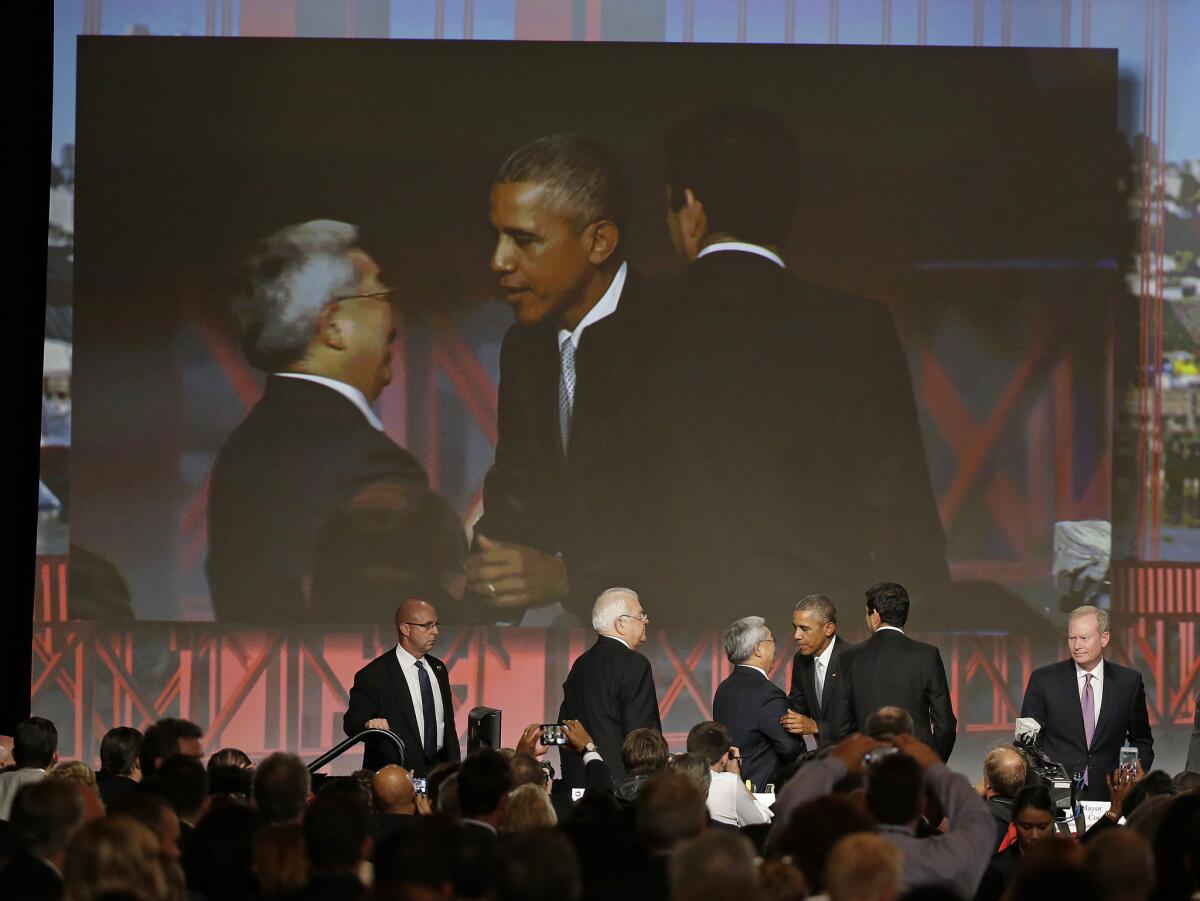Analysis: Obama, Clinton mining state’s gold, not voters

President Obama is greeted by San Francisco Mayor Ed Lee after making an address to the U.S. Conference of Mayors on Friday.
- Share via
SAN FRANCISCO — Last week proved anew just how convincingly California has become the place where politicians go to rich people’s homes to talk about the lives of less-fortunate people they rarely meet.
President Obama crossed into Southern California airspace on Thursday and promptly took part in two events with donors, one at the home of producer Chuck Lorre and the second hosted by entertainer Tyler Perry. Later he had dinner with Hollywood moguls Steven Spielberg and Jeffrey Katzenberg.
“Just dinner with friends,” White House spokesman Eric Schultz said.
On Friday, after an interview for a comedian’s podcast in Highland Park, Obama spoke in San Francisco at the annual meeting of the nation’s mayors, then hit fundraisers on Nob Hill and at the Golden Gate Bridge-view home of Tom Steyer, the hedge-fund billionaire who spent $74 million to become the nation’s most generous individual political donor in 2014. Then it was off to Palm Springs, where Obama had plenty of time for a couple of rounds of golf before Sunday’s departure.
Hillary Rodham Clinton surfaced in Southern California on Friday, holding three fundraisers in wealthy environs during which she “continued talking about her commitment to being a champion for everyday Americans,” her campaign said.
She spoke to the mayors in San Francisco on Saturday, then raised money elsewhere in the city. Clinton’s speech to the mayors, an emotional discussion of the lasting stain of racism, was the first non-fundraising event in California of her two-month-old campaign.
For Democrats, the absence of a connection with the non-wealthy in California prompts a certain unease, since it cuts against the party’s desired image and policy priorities. But it also represents a giant political victory, one whose major participants include Clinton and her husband, President Clinton, and Obama.
When a state is completely in the bag for either political party, there’s no need — indeed, it arguably would be wasteful — to spend the resources it takes to mount an effort to persuade voters. And with more than a little help from Republicans, Democrats have commanded the state completely for two decades.
As last week reminded, California now serves the single purpose of providing the financial heft to be used in the states that matter.
“California’s just different. It’s a money machine now, more than anything else,” said Tom Epstein, a former Clinton administration political hand and now a vice president at Blue Shield of California, based in San Francisco. Epstein’s experience dates to the days it wasn’t.
Little more than a generation ago, California’s urban centers, suburban sprawl and rural towns were regular battlegrounds for presidential candidates. In 1988, Republican nominee George H.W. Bush held two campaign events in Southern California the Sunday before election day, a time set aside for big targets. A few days earlier, Democratic nominee Michael S. Dukakis had chartered a train to choo-choo up the Central Valley, where he spoke in Hanford, Fresno and Stockton.
Bush won — but when he ran for reelection four years later, Bill Clinton used California to paint himself as the candidate who best represented the future. Voters cranky about the recession-battered present sided with him.
Clinton’s 13-point victory here was striking, and easy. His last California visit came weeks before the election, with an exclamation-point foray into the then-Republican stronghold Orange County.
Epstein became the administration’s California point person, charged with keeping Clinton in good favor here as he looked to repeat his victory in 1996.
California “was a very high priority,” Epstein said. “Virtually every trip he did he had a little reception for his supporters and tried to keep them fired up and engaged.... The president really enjoyed California as we all know, enjoyed hanging out with the Hollywood types and engaged pretty well with Northern California. It was a top political priority in a way it just isn’t any more.”
The attention dovetailed with Republican campaigns against illegal immigration that enraged the state’s growing Latino population, whose retribution cinched Clinton’s second victory and four subsequent Democratic presidential wins here. President Obama lost the 2008 primary to Hillary Clinton but won swamping victories here in the last two general elections.
Nothing, at this early moment, appears to stand in the way of Hillary Clinton winning a resounding primary victory in June, followed by the seventh-straight general election win for a Democrat in the state. Every California poll shows her as the front-runner.
Hillary Clinton could use the state’s cutting-edge image as Bill Clinton did, embracing the tech wonders of Northern California — where the state’s center of political gravity has shifted — to portray herself as completely in tune with the economic needs of the future. That is one of her main planks, but there will be a temptation to put forward that argument — and all others — in states that matter.
For his part, Obama has lavished attention on California’s fundraising salons — the Bay Area visit was the 20th of his presidency, most of them involving money. To the mayors on Friday, he noted the presence of Gov. Jerry Brown and Rep. Nancy Pelosi of San Francisco, briefly praising Brown’s moves on climate change and lauding the House Democratic leader despite their recent break over a trade treaty.
Apart from that, there was no talk about the state in which he stood. The mayors, to be sure, came from all over, so parochialism might have had limited benefits. But it seemed symbolic nonetheless that Obama said almost nothing at all about California before he left to collect more of its money.
Twitter: @cathleendecker. For more political news and analysis, go to https://www.latimes.com/decker.
More to Read
Sign up for Essential California
The most important California stories and recommendations in your inbox every morning.
You may occasionally receive promotional content from the Los Angeles Times.














